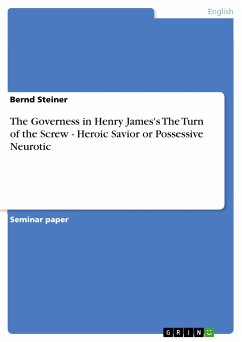Essay from the year 2006 in the subject American Studies - Literature, grade: 1,0, University of Freiburg, course: Henry James in Transition, language: English, abstract: Many of the critics writing about The Spoils of Poynton belong to one of two groups: “Either they take Fleda to be the heroine of the story in the traditional sense […] or they have taken her to be neurotic and self-deceiving, pathologically fearful of sex, and contributing more harm than balm to the domestic row between the Gereths” (Lodge. Introduction: 5). Both ways of interpretation actually imply that Fleda is indeed the ‘free spirit’ James intended. This view is particularly clear in the wikipedia article which states that “Fleda Vetch has earned most critics' sympathy for steering the right course through an almost impossible situation” (Wikipedia). The talk of a ‘right course’, however, reveals the author’s belief that Fleda has a choice. In the following, I want to argue that the exact opposite is the case. Fleda’s actions are not based on moral considerations but rather on existential necessities. Her freedom is therefore restricted to the realm of her imagination; all other decisions are dictated by the expectations of society. This is also the one unifying force to which all characters are subject and due to “his own disillusionment with existing English society” (Lyons. Social Vision: 64), James uses the comedy and irony in The Spoils of Poynton as a vessel to convey his social criticism.
Bitte wählen Sie Ihr Anliegen aus.
Rechnungen
Retourenschein anfordern
Bestellstatus
Storno









